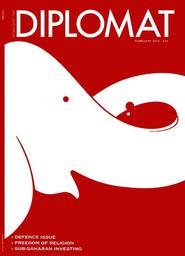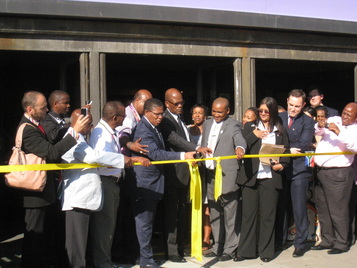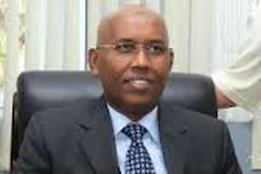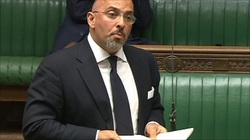
Diplomat Magazine is 65 years old this year and aimed at the diplomatic community in London, which includes the heads of mission and diplomats at the capital's 162 Embassies and High Commissions and MPs and members of the House of Lords dealing with Foreign affairs.
You can read the reports here:

South African Sports Minister opened the Ekhaya centre last night, which will provide a home from home for South Africans and showcase their culture, reports Miranda Kaufmann.
On a hot sunny evening, a large drum was placed outside the door to Queen Elizabeth Hall on London's Southbank. It still had its luggage tag with LHR for London Heathrow clearly printed on it. It was closely followed by the Dance Africa Dance troupe, also fresh off the plane from Johannesburg. They danced and sang and crowds gathered to watch the colourful spectacle. Soon, the South African Minister for Sport and Recreation, Fikile Mbalula arrived and cut the yellow ribbon, formally opening the Ekhaya.
Ekhaya is a Nguni word meaning 'home' and the South Africans have set up camp in the Queen Elizabeth Hall for the duration of the Games to create a 'home from home' for athletes, supporters and ex-pats, filled with South African art and culture and a programme of events and entertainment to not only make South Africans feel at home, but also to showcase what South Africa has to offer to the world.
The show began immediately, as the rousing music of Vusi Mahlasela struck up inside and the minister, and other dignitaries including High Commissioner Dr Zola Skweyiya, South African Sports Confederation and Olympic Committee (SASCOC) President Gideon Sam and Chef de Mission Patience Shikwambana were shown around the centre, which had been painted bright yellow and was full of art and crafts from South Africa's nine different provinces, displayed in the aptly-named Beautiful Things exhibition.
There followed some speeches of thanks and then the South African High Commissioner, Dr Zola Skweyiya took to the podium to say that his countrymen should be proud, not afraid, to be known as South Africans.
Then SASCOC President Gideon Sam said that, just as many years ago, the English came to Africa, South Africa was now annexing a small part of the United Kingdom. He joked that he couldn't guarantee when they would be giving it back. Although they were only staying for a couple of weeks, they would make their presence felt. He added some advice for those facing transport problems during the Games: Grab a horse from a policeman!
In a spirited, rousing and heartfelt address, Sports Minister Mbalula explained that the Ekhaya was an opportunity to tell South Africa's story to the world. He recalled that Londoners had stood side by side with South Africans in the battle against apartheid, staging many protests in Trafalgar Square. No longer battered and tortured, South Africa is now a nation with dreams. Their Olympic athletes have been released like free birds, empowered by the spirit of Nelson Mandela. Inspired by recent victories in the British Open golf championships and Test Cricket, they are now aiming to take at least 12 medals home.
The speeches were followed by cocktails in the St Paul's pavilion. The Ekhaya Hospitality Centre will be open daily from 10am until the end of the Paralympic games, with a lively calendar of cultural events, ranging from music from world-renowned acts including Vusi Mahlasela, Sipho "Hotstix" Mabuse, Thandiswa Mazwai, the Parlotones, Ringo, Tamara Dey, Dance Africa Dance and Mapantsula to screenings of South African films, South African comedy acts and a South African fashion show.
 Ilyas Moussa Dawaleh of Djibouti
Ilyas Moussa Dawaleh of Djibouti Diplomatmagazine.com, 13 July 2012.
This morning APCO Worldwide and Diplomat magazine hosted a Breakfast Roundtable at APCO Worldwide’s offices on Long Acre with the Djibouti Minister for the Economy, Finance, Industry and Planning, Ilyas Moussa Dawaleh. Over a generous selection of coffee, teas, pastries and fruit, the Minister abandoned his native French to address the international audience in fluent English.
This was Dawaleh’s first visit to London as Minister and forms part of a tour of English-speaking nations to put Djibouti on the map. A small country of 23,000 square meters, with a population of less than one million, limited resources and 45 degree summers, it is Djibouti’s geostrategic position that is its greatest asset. With major ports situated at the crux of three continents, Djibouti has French, German, US and Japanese military bases and is the headquarters of the Atalante mission, an EU mission coordinating the fight against piracy. A new Regional Anti-Piracy Institute is due to open there by the end of year, making it a key actor in international security and the fight against terrorism and piracy.
Djibouti also plays a central role in international trade, with 80% of the world’s oil trade and one third of all international trade passing through the region. It has the largest container terminal in east Africa, with one million containers being processed there each year, and has the biggest fibre-optic cable network in Africa, making it vital to continental progress in telecommunications.
Dawaleh outlined his country’s vision for 2035. Building on existing strengths, Djibouti aims to become the largest logistic hub in Africa, using 100% green energy. Also, they hope to become the number two destination in the world for scuba diving, after Sharm-el-Sheik. The key to these ambitions is to improve Africa’s poor infrastructure, which Dawaleh identified as being a root cause of poverty. Becoming better connected will help to change that and combat the challenge of youth unemployment. The ICT sector will provide much needed jobs. Erickson is one company that has come to Djibouti. In the past, education in Djibouti has favoured the theoretical over the vocational: in future, young people will be trained in the practical skills required to help take their country forward.
The talk was attended by Inspector General Hassan Issa Sultan, the Ambassadors of Finland and Ethiopia, the High Commissioner for Cameroon and diplomatic representatives from Australia, Nigeria, British Virgin Islands, the Czech Republic and others.
The Finnish Ambassador, His Excellency Mr Pekka Huhtaniemi, identified a ‘hub’ strategy, and enquired whether Djibouti saw places such as Hong Kong, Singapore, and Panama as role models, and asked about the role of financial services. The Minister felt Singapore was the closest model for Djibouti and stressed that good infrastructure was vital to developing financial services. He indentified the stable currency in Djibouti as a major advantage: there has been no fluctuation in the exchange rate with the $US since 1949. ($1 = 1.76 Djibouti Francs).
The High Commissioner of Cameroon, His Excellency Mr Nkwelle Ekaney, asked about the need for foreign investment in infrastructure. Dawaleh agreed that foreign direct investment was needed and confirmed that Djibouti had recently made a $300 million investment agreement with the Chinese government.
APCO's Tomas Eymond-Laritaz asked about the democratic future of the country where the Government lost a regional election in Djibouti City (home to 80% of the country’s population) three months ago. The Minister said that at the next elections in January 2013, a move to proportional representation should allow a minority opposition to emerge. Ultimately, Djibouti’s vision for 2035 relies on peace and political stability and developing a better infrastructure to enable it to make even better international connections.
 MP Nadhim Zahawi
MP Nadhim Zahawi Diplomatmagazine.com, 5 July 2012.
This morning Conservative MP Nadhim Zahawi addressed young diplomats on “The Arab Spring and its implications for the UK and Europe” at the YDL – Diplomat magazine Breakfast at the Hyatt Regency Hotel - The Churchill.
Prior to being elected MP for Stratford on Avon in May 2010, Zahawi was an award-winning businessman, CEO of YouGov, with the unusual distinction of having won an award for Craziest Parking ticket in 2004, when after a crash, his bike got an £100 fine as he lay in the back of an ambulance.
This morning, in a brief address, Zahawi outlined three main ways in which the Arab spring would affect the UK and Europe: disruption of the oil trade; a significant rise in immigration through Turkey to Greece, and the continued threat of war in Syria, which could escalate to involve neighbouring Lebanon and become a proxy-war, waged between Iran and Saudi Arabia and Qatar. Such a conflict could polarise world opinion, provoking high-scale intervention.
He strongly asserted the importance of allowing democracy to develop organically, at a pace that is right for each country. After all, he remarked, it took 713 years for the UK to become a “fully-fledged” democracy- from signing Magna Carta in 1215 to giving votes to women in 1928.
H.E. Werner Matías Romero, the Ambassador for El Salvador asked what sort of timetable Zahawi had in mind, given that South America, which was more like Europe than the Middle East, was still far from ideal in democratic terms.
In response, Zadawi, referencing Gary Marcus’s Kluge: The Haphazard Construction of the Human Mind (2008), suggested that it was necessary for voters to move past the instinctive choice of strong leaders, to make more rational, educated choices.
The MP also highlighted the work of the Westminster Foundation for Democracy, which aims to give emerging democracies a helping hand by sharing knowledge, as in this recent project to give Iraqi people a voice.
Counsellor Ara Margarian of Armenia asked what lay in store for the Christian minorities in the region, and whether they were likely to suffer the same fate as those driven out of Iraq. Zadawi, whose own Kurdish parents fled the persecution of Saddam Hussein, commented that he had observed positive steps taken in Iraq to protect the remaining Christian population.
Zahawi admitted that he didn’t have all the answers, but he certainly provoked some interesting questions and this YDL – Diplomat magazine Breakfast gave all who attended food for thought (besides the croissants).
 RSS Feed
RSS Feed
